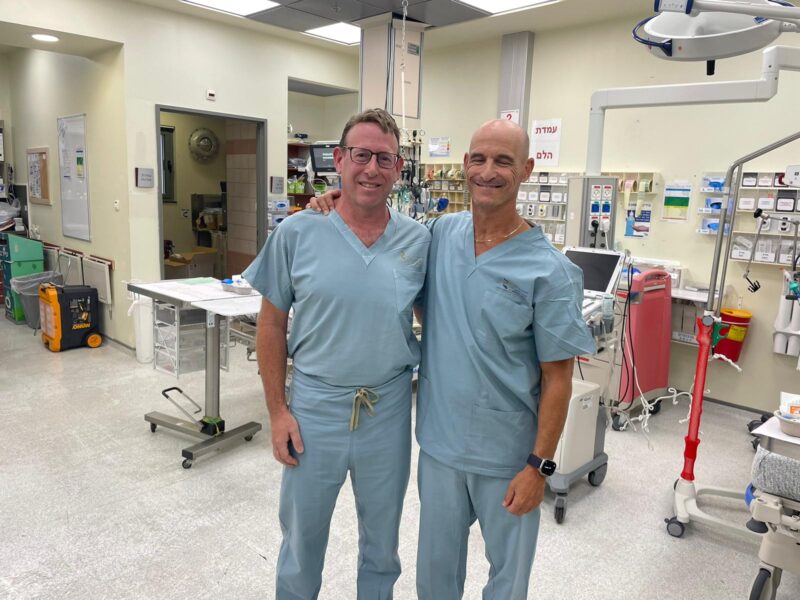Reporting for duty
Doctors, nurses, medics from U.S. in Israel waiting to be needed, hoping they won’t
Thousands of medical professionals have offered to come to Israel, but only a few dozen have actually been able to volunteer

Courtesy/Emergency Volunteers Project
Dr. Ken Tepper and Dr. Allan Tissenbaum stand in a hospital room at Ziv Medical Center in Safed, Israel, in October 2023.
Within a day of hearing about the massacres in southern Israel on Oct. 7, Dr. Allan Tissenbaum was ready to come to Israel to volunteer in a hospital or with a military medical unit.
Unlike thousands of other American doctors who have registered to volunteer, Tissenbaum, an orthopedic surgeon from Pittsburgh, along with roughly three dozen other doctors, nurses and paramedics came to Israel last week, training and waiting and hoping that they won’t be needed as part of the Emergency Volunteer Program, an initiative that in the past has mostly focused on bringing American firefighters to Israel.
In light of the scale of the devastation in Israel after the Oct. 7 attacks and the potential for further stresses on the Israeli medical system, EVP began working to bring over American doctors, something it had never done before in significant numbers.
“On Saturday, as soon as we heard about the massacre, we came to EVP and got a notification that this is going to happen and it was just a question of when and where we would be going,” said Tissenbaum.
Tissenbaum said he first registered to volunteer with EVP in 2016 or 2017. His wife, who is active in the local Jewish federation, helped bring the organization to Pittsburgh after hearing about it at an American Israel Public Affairs Committee conference.
He arrived last Monday and trained for a few days in Jerusalem before moving to Safed’s Ziv Medical Center along with four other doctors. Other volunteers have been sent to train with the Israel Defense Forces so they can practice in military clinics or on military ambulances (only within Israel proper, not in Gaza).
Adi Zahavi, CEO of EVP, told eJewishPhilanthropy that his organization has maintained its relationships with the Israeli government over the years so that its medical volunteers can more easily get the accreditation and approvals that they need, preventing a “bottleneck” that other volunteer groups are experiencing.
In addition to bringing over some 35 medical professionals, EVP has also brought over dozens of firefighters who have been bolstering Israeli fire departments throughout the country since the start of the war. In addition, the organization has brought over teams to operate industrial kitchens that have provided over 40,000 meals to Israelis affected by the war.
Even as doctors and other medical professionals have been called up to the reserves, the Israeli health-care system has not yet faced a significant staffing shortage as hospitals have postponed elective surgeries and worked to release non-urgent patients. As a result, the volunteers have not had much work to do, which Tissenbaum said they consider to be a good thing.
“No one has lost their enthusiasm. We came to do a job but we’re hoping not to have to do a job,” he told eJewishPhilanthropy. “We want to do something, but we also don’t want to do something because us doing something implies injured Israelis, injured soldiers, injured civilians.”
Tissenbaum said he and the four other EVP doctors are focused on learning how to work at Ziv hospital so that should the war in Israel worsen — specifically if the Lebanon-based Hezbollah terror group ramps up its attacks on northern Israel — they will be able to step in seamlessly and help.
“[At Ziv,] they are very accustomed to dealing with complicated trauma. But no one has enough coverage to deal with things if they get crazy, if the northern border opens up,” he said.
In addition to the roughly 35 medical professionals already in Israel, dozens more are registered to come as needed, and EVP said it could potentially recruit hundreds more if necessary.
Tissenbaum said he is scheduled to return to the U.S. at the end of the week, but he is prepared to remain in Israel or return to Israel in the future if necessary. Now that he is acquainted with Ziv Medical Center, he can “seamlessly” begin operating there.
“Right now, for us, there’s nothing going on. Everyone’s in a holding pattern,” he said. “We head back this weekend, but if something happens and we’re needed, I’m staying.”












